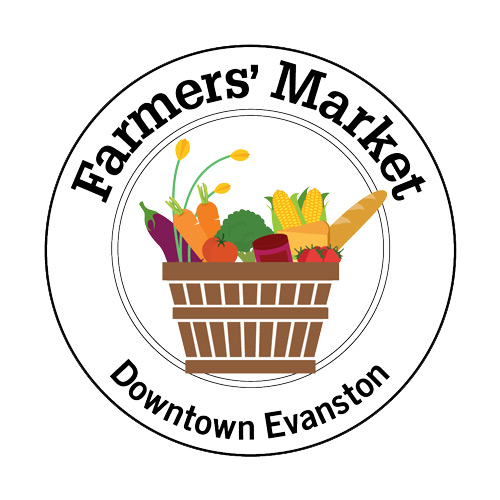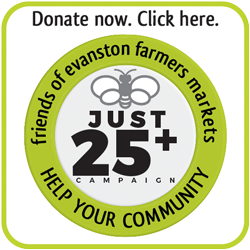Evanston’s downtown Farmers Market is about to launch (May 9), and I am as excited about that opening day as I am about spring’s arrival and the bizarre early success of four of our major league teams. Let me confess at the outset that as a kid who always loved his groceries, I have been spoiled rotten. If I were a vegetable, I’d be all soft and mottled and ready for composting.
Two factors in my development led me to this condition. First of all, my family is chocked full of fabulous cooks. My mother made gourmet meals for us almost every night, which was a good thing, since my dad insisted that dinners last two hours, or at least until each of us had contributed in some significant way to the conversation. Aunts, cousins, and a strong sampling of men in the family knew their way around a kitchen. Secondly, I had easy access to farms. My grandfather kept crops on a few acres in Iowa, and my aunts and uncles farmed in Montana. Summers meant farm to table for me.
I’ll share two of many happy memories. My grandfather, a history professor at Cornell College and a fan of the Transcendentalists, kept milk cows in his barn and grew corn and a small grove of apple trees in the rich black Iowa dirt of his back acre. I loved the applesauce he ground for its intensely tart sweetness and for the chunky bits. And I loved his corn, drenched in butter and lightly salted or just hot on the cob. Grandpa argued that corn would begin to oxidize five minutes after picking, so we would pluck some ears and rush them into a boiling pot to capture the highest level of kernel popping sweetness. We learned to eat any leftover cobs the next morning right out of the fridge, no butter, maybe a touch of salt. Yum.
Cut to Montana, 1963. Cousin Jeff and I had just traded jabs to our mugs after arguing about who would give his sister (my beautiful cousin) a piggyback ride. She had wisely rolled her eyes and ditched our fracas, leaving us fat-lipped and mopey, shuffling down the dirt road, where, as if to rescue the moment, a branch of a cherry tree, laden with Bings, reached over the fence offering us a snack. Since some of the fruit hung outside the farmer’s property, we felt justified to help ourselves. Yowza. If, on a summer morning, you have ever bitten into a fat, ripe, crisp, black Bing cherry, almost the size of a plum, you know that that flavor has power to distract belligerents.
Those years in Iowa and Montana helped launch my love for food and my forays into markets. No doubt we romanticize farming and the simplicity of rural life, partly thanks to Thoreau. The truth is that farming and ranching remain among the most dangerous occupations in America.[i] Therefore, most of us don’t care to farm (maybe some basil and mint in a window sill). But we love the food and the convenience of easy access to high quality victuals. Still, convenience has a cost, a cost that escapes the eye at first glance.
For years the concentration of capital among and control of the land by a few giant producers coupled with relatively low expenses for consumers have been our highest values. In short, we like to have our food quickly and cheaply, and industrial scale agribusinesses have enjoyed enormous profits meeting that demand. You may surmise the path I have chosen for this argument. Surprisingly, however, dear reader, reliable studies have shown that Farmers Markets are NOT harder on your pocketbook than grocery stores.[ii]
The issue of cost runs more deeply than our pocketbooks. Many studies suggest that our dependence on industrial scale agriculture has wrought enormous damage to our environment, to complex ecosystems, to our health, and, most worrisome, to the long-term sustainability of our soils. (A good overview of the issues can be found on the Union of Concerned Scientists’ website.[iii]) Colin Tudge, British biologist and author, issues a clarion warning that “industrial farming doesn’t feed everybody, has led to mass unemployment and the poverty and despair that go with it, and is wrecking the fabric of the world.” He calls for a “third route” to reform by which we all support “small mixed farms…small shops and farmers’ markets and delivery services to serve those new farms.”[iv] Dan Barber echoes that call to push for sustainability in his thorough examination of our food habits, The Third Plate. So have I hit a chord for you, my dear progressive eater?
We should all be aware that the world, yes, even America, is full of food deserts and hungry people. Evanston has hungry people, but it is not such a desert. We are all spoiled, to some degree, living on good soil by the shores of Michi gami. And now that spring is here, the Farmers Market brings the bounty to another level. Think how much you love good food, especially when it’s fresh, salubrious, locally raised, delicious and good for the environment. I know each of us has sweet memories of meals with family and friends. Now picture how such wonderful meals depend on responsible cultivation of our rich soil. We consumers can control the path that our economy follows. If we could nudge our nation away from the mono-culture giants, toward support of small farms, we might see immediate benefits beyond the flavors our own dinners.[v] So, armed with awareness of your impact as an eater and with a healthy appetite, get your hungry self over to the Farmers Market each and every Saturday.
We should take pride in our Farmers Market. It has been active for forty years, every summer since Harriet Friedlander founded it in 1975. It features sixty vendors offering a great variety of delicious, locally produced food. And think of the enhancements beyond produce, such as music and brunch and people-watching and good conversations. Thanks to the efforts of Friends of Evanston Farmers Markets, LINK shoppers receive matching money (up to $50). So put on your walking shoes and your backpack to save the world and feed your face! See you Saturdays at University & Railroad!
By Stephen W. Littell, Friends of the Evanston Farmers Markets
[i] Smith, Jacquelyn. The 10 deadliest jobs in America. Business Insider, Dec. 5, 2014. Online Apr. 25, 2015. Businessinsider.com.
[ii] Estabrook, Barry. The farmers’ market myth. The Atlantic, May 10, 2011. Online Apr. 25, 2015. Theatlantic.com.
[iii] Hidden costs of industrial agriculture. Cited online Apr. 25, 2015. Ucsusa.org.
[iv] Tudge, Colin. Why the world needs a renaissance of small farming. The Guardian, September 18, 2012. Online, Apr. 25, 2015. Theguardian.com.
[v] Hart, Emily. Benefits of small-scale agriculture on rural communities. Online, Apr. 25, 2015. Downtoearthfarming.org.




